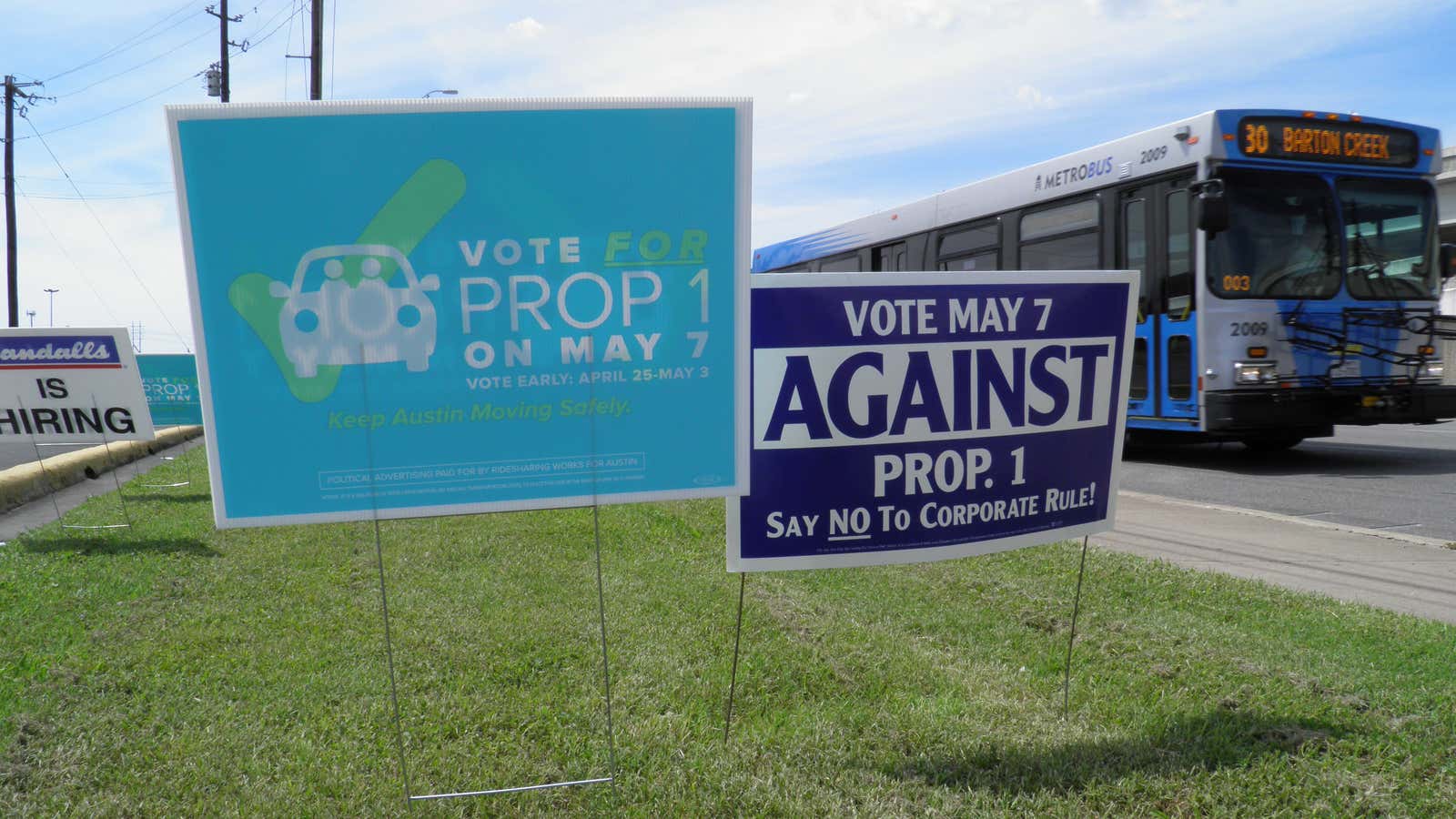Uber and Lyft spent nearly $9 million on a May 7 special election in Austin, Texas. They offered free rides to the polls, and texted users asking for their support. They pulled out all the stops in a political playbook that has worked in almost every other city in the US.
For once, it wasn’t enough.
Voters in the Texan capital came out against Proposition 1, upholding ride-hailing regulations that the city council passed in December. The rules are stricter than ones that Uber and Lyft face in other jurisdictions: They require drivers for the services to pass fingerprint-based background checks, to identify their cars with company emblems, and to avoid picking up and dropping off passengers in certain lanes.
Though this was one election in one city, it’s hard to overstate the significance of the outcome. Uber and Lyft have never shied from political hardball when it comes to getting their preferred rules on the books, and over the course of 2015, nearly two dozen states passed ride-hailing laws that Uber supported. The companies have come out on top after fraught political battles in Seattle, Las Vegas, New York, and San Antonio, to name just a few.
“Uber, I think decided, they were going to make Austin an example to the nation,” said David Butts, a local political consultant who helped coordinate the campaign against Proposition 1, according to a report in the Austin American-Statesman. “And Austin made Uber an example to the nation.”
Ahead of the vote, both Uber and Lyft had threatened to leave Austin should the proposition fail. Austin mayor Steve Adler invited them to stay despite the election results.
Neither Uber nor Lyft immediately responded to a request for comment.
The nay vote on Proposition 1 is all the more crushing for Uber and Lyft considering the lopsided amount of money they spent in favor of it. The companies invested a combined $8.7 million to support the proposition via their lobbying committee, Ridesharing Works for Austin, an unprecedented sum in Austin local politics. That dwarfed the $132,000 that Proposition 1’s opponents strung together from about 500 individual contributions, according to campaign finance filings.
Uber and Lyft claim that fingerprint-based background checks make ride-hailing services untenable. It’s unclear whether that’s actually the case. Uber, notably, has operated in Houston, the largest city in Texas, for over a year and a half despite the fact that fingerprinting there is mandatory. Earlier this week, the company threatened to leave Houston if the city’s regulations aren’t overhauled. It pulled out of another Texas city, Corpus Christi, in March after policymakers there adopted fingerprinting requirements for ride-hailing services.
Uber and Lyft have cultivated the impression that their services are indispensable to cities. But Uber in particular has also spun itself as politically unbeatable. It has the money; it has the policy talent; it has the app that makes reaching potential voters as simple as sending a text or push notification to their phones.
“Nearly every time we try to set up shop in a new city, there’s a powerful industry with powerful allies who try to stop progress,” Uber CEO Travis Kalanick remarked on the company’s five-year anniversary last June. “The only reason they haven’t succeeded is because of you. It’s because there’s always a handful of Uber riders and drivers who decide to stand up and speak out and petition City Hall. And then they’re joined by a few more. And then a few more. And pretty soon, an entire community of people is fighting for a new way of doing things that makes their lives a little easier.”
That’s a potent narrative. With the loss in Austin, it’s starting to come undone.




